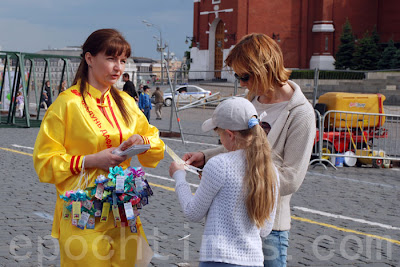俄国法轮功学员 现莫斯科庆祝活动
Moscow Police Orchestra Changes Official Tune on Falun Dafa
(ENGLISH TRANSLATION BELOW)
【大纪元2012年05月31日讯】(大纪元记者许惠安报导)来自俄罗斯5月27日的消息,在莫斯科“红场”,法轮功学员应当地高阶特警单位邀请, 参加了大型运动庆祝活动。身着警服的主持人拿起麦克风介绍,首先出场表演的是“伟大及强大的法轮大法”学员。
众所周知,中共与俄国政府的紧密关系,近年来俄罗斯法 轮功学员的活动 受到一定程度的限制。 所以此次法轮功学员受邀参加红场的大型活动引起了广泛关注。
据了解,此次法轮功学员是被一个高阶特警单位的交响乐团的指挥邀请。 活动组织者表示,接连数日在红场举行的活动吸引了近10万人参观。
此活动在俄罗斯克里姆林宫旁的“红场”举行。法轮功学员组成的腰鼓队及舞狮不断地围绕红场游行了四个小时,精神抖擞,击鼓震天。
现场的学员还进行法轮大法五套功法的演示,另外,一旁设有15张桌子来摺纸莲花。由于索要者众,许多人根本无法接近折莲花的桌子。
现场的法轮功学员兴奋地表示,这真是前所未有的经历。
(责任编辑:许惠安)
Practitioners of spiritual practice, formerly harassed, welcomed at event on Red Square
Changes in the political climate in Beijing appear to have changed the official attitude in Moscow toward the spiritual practice Falun Gong.
On May 27, practitioners of Falun Gong (also known as Falun Dafa), were invited to participate in an event organized by the Police Orchestra of Moscow celebrating sports. The event, attended by over 10,000 people, was held on Red Square in Moscow, just beside the seat of Russia’s government, the Kremlin.
The event’s emcee was a policeman in uniform who introduced the Falun Dafa practitioners taking part as “the great and powerful Falun Dafa!”
Russian police have not always been so welcoming to Falun Dafa practitioners.
Falun Dafa’s main text, Zhuan Falun, was banned by a Russian court in 2008—a ban that was finally upheld in 2011 by a Russian appeals court after a three-year legal battle.
Police have in the past frequently visited the homes of practitioners to harass them, and practitioners were not allowed to hold large gatherings.
The Russian police would allow only one practitioner to stand outside the Chinese consulate at a time in protest against the persecution of Falun Gong in China. If a passerby walked up to that practitioner to ask for more information, the police would treat the conversation as a gathering of two people and arrest the practitioner.
The harassment had its origins in the Russian government’s close ties to the Chinese Communist Party (CCP).
When Zhuan Falun was first banned in 2008, the head of the Moscow Helsinki Group, and Sakharov Prize laureate, Lyudmila Alexeyeva, denounced the court case as unlawful.
“The decision was made only because Falun Gong practitioners are persecuted in China and leaders of our country have good relations with China. And clearly, for political reasons, to get approval from the Chinese leaders, these decisions were made,” Alexeyeva said at the time.
Falun Dafa involves doing five meditative exercises and living according the principles of truthfulness, compassion, and tolerance, as set forth in Zhuan Falun and other books.
The practice was introduced in 1992 and rapidly became very popular. By 1999, between 70-100 million people had taken up the practice in China, according to a study done by the Chinese Sports Administration.
In July, 1999, the then-head of the CCP, Jiang Zemin, launched a campaign to “eradicate” the practice. Jiang feared the popularity of Falun Dafa and considered its teachings a threat to the CCP’s ideology.
The persecution has continued since, but the conditions for its continuing much longer are threatened.
Jiang organized a faction to carry out the persecution, but in April, Bo Xilai, a leading figure in that faction, was removed from all Party posts and is currently under investigation. The most powerful member of the faction, domestic security czar Zhou Yongkang, is also under investigation and is expected to be purged in the near future.
Premier Wen Jiabao, according to those familiar with comments made by him at Party meetings, has urged that the persecution of Falun Dafa be ended.
With Jiang himself in a vegetative state and his faction losing power, the Kremlin has no obvious advantage in continuing to harass Falun Dafa.
At the event on Red Square, Falun Gong practitioners did traditional Chinese waist drum and lion dance performances while walking around the square continuously for four hours, enlivening the event.
Practitioners also held various other performances, demonstrated the practice’s exercises, and set up 15 tables for the folding of paper lotus flowers. The Falun Gong exhibit was so popular that many visitors were unable to get close enough to the tables to fold paper lotuses.
Falun Gong practitioners from other parts of Russia even sent boxes of lotus flowers to Moscow by giving them to train conductors to pass to the Moscow practitioners, so that there would be enough flowers to distribute to all the people.
Falun Dafa is practiced in over 114 countries around the world and often receives support from national or local governments. The U.S. Congress has passed four resolutions calling for an end to the persecution of Falun Dafa in China and over 14,000 proclamations honoring Falun Dafa have been given by U.S. state and local governments.











